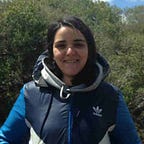Verónica Dahl — Founding Mother of Logic Programming
In the 10th day of our calendar we change continent to introduce you to Verónica Dahl, the Argentinean computer scientist that stands among the founders of the Logic Programming field. As if this were not enough, she didn’t stop in one discipline, but cultivated an astonishing multidisciplinary career that began with language processing and logic grammars, and went into unexpected areas like computational molecular biology, internet technology and constraint-based reasoning.
Logic Programming
Dahl became a computer scientist at the Universidad de Buenos Aires in 1974 and later emigrated to France due to the tough political situation Argentina was facing (one of her childhood friends was machine gunned by the military junta).
In the south of France at the Université d’Aix-Marseille she finished her PhD becoming one of the first women with a doctorate in Artificial Intelligence. She then moved to Canada and started working at the Simon Fraser University, from where she is currently a Professor Emeritus at the School of Computing Science.
Throughout her career Dahl combined her love for literature (poetry and short fiction) with computer science and used the logic programming paradigm within the intersection of three main fields: artificial intelligence, computational linguistics and computational molecular biology.
In the area of molecular biology, one of her main contributions was that she participated in models of computational linguistics that revolutionized the process of automatic analysis of biological molecules, such as identification of DNA barcodes and oligo signatures. Her book Logic Grammars has been cited as a main resource that helped with deciphering the human genome. That’s quite a feat!
I have always been fascinated by languages of any kind, as communication is a paramount activity among humans, and even “lesser” biological entities have their own sophisticated languages, as exemplified by DNA or RNA strings.
Dahl also created HYPROLOG, a declarative new logic programming language with hypothetical reasoning capabilities. She did so by extending Prolog (PROgrammation en LOGique) with non-classical lines of reasoning such as abduction and assumptions, burrowing syntax from Constraint Handling Rules (CHR) for integrity constraints. Assumptions and abduction are especially useful for language processing and allow us to move beyond the rigid limits of classical logic to explore “what-if” scenarios. HYPROLOG constituted the first programming language that could interpret queries and commands in a human language in the logic programming paradigm. Some basis of this can be seen in one of her articles produced in her early career days in Buenos Aires:
The Underrepresented Majority
Surprisingly, when Dahl graduated female students in Argentina were 75% of the students in computer science, yet at present day they represent only 11%. However, more women didn’t necessarily mean more equality. Her career is filled with anecdotes that leave this more than clear.
For instance, Dahl frequently received letters from colleagues addressed as “Dear Sir”. One day she got an e-mail from the Association of Logic Programming asking if she would accept the honour of being recognized as one of the “founding fathers” of the field. After a big laugh she then replied, “I would be very honoured, unless it implies a change of sex operation”.
While working in the Simon Fraser University she applied to become a full professor but was told not to have enough academic publications although a male colleague had recently been promoted with fewer.
She was also refused the reimbursement for babysitting costs (USD17) while she was giving a lecture at an international conference and was told “having a child is a choice”. She ended up protesting to the Natural Sciences and Research Council of Canada. Thanks to her struggle, they changed the policy to allow any researcher they funded to expense childcare when attending conferences while nursing.
“Young women typically don’t see themselves as being discriminated [against]. But while we’ve addressed some problems, over all we’re not that much better.”
There is still much to do about female underrepresentation as today computer science, engineering and artificial intelligence are still male-dominated fields. Fortunately, Verónica Dahl gave several battles (and still does) to what she perceived as gender bias and persistently fought for those to come, as many of the previous pioneers, by adopting affirmative actions through helping, mentoring and encouraging women.
“What gets created depends on who is creating it”.
Advent Calendar — Help us make it a book!
From December 1st until December 24th we plan to release one article each day, highlighting the life of one of the many women that have made today’s computing industry as amazing as it is: From early compilers to computer games, from chip design to distributed systems, we will revisit the lives of these pioneers.
Each article will come with an amazing illustration by @SebastianNavasF
If you want to see these series to become a book with expanded articles and even more illustrations by Sebastián, then subscribe to our newsletter below.
Credits
- Illustration: Sebastián Navas
References
- Abramson, H., & Dahl, V. (1989). What Are Logic Grammars?. In Logic Grammars (pp. 5–15). Springer, New York, NY.
- Dahl, V. (1981). Translating Spanish into logic through logic. Computational Linguistics, 7(3), 149–164.
- Dahl, V. (2017) Research Seminar: Women in AI, Engineering and Computer Sciences (https://drive.google.com/file/d/0B6wLCJzkQuPSS2ZjSHk3QkhFLUs5WTNKTEN1NFEzNHBsQzk0/view)
- Gender equality eludes ground-breaking scientist. 2013. Erin Millar — Special to The Globe and Mail (https://www.theglobeandmail.com/news/national/education/gender-equality-eludes-groundbreaking-scientist/article8408371/)
- Simon Fraser University personal website (http://www.sfu.ca/people/veronica.html)
- The Early Days of Logic Programming: a Personal Perspective. Association for Logic Programming (https://dtai.cs.kuleuven.be/projects/ALP/newsletter/may06/)
- Wikipedia Profile (https://en.wikipedia.org/wiki/Veronica_Dahl)
